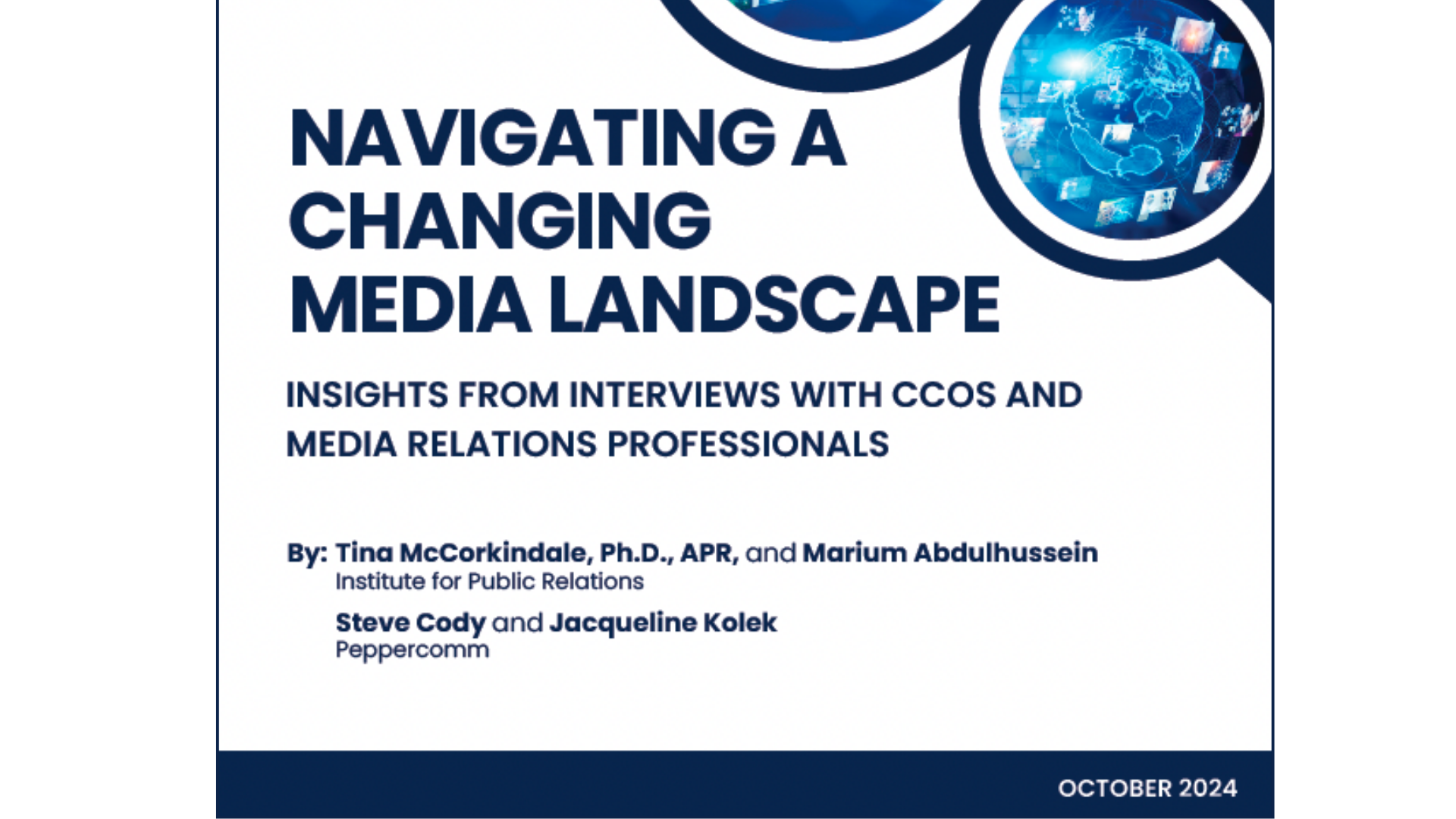CCOs and media relations professionals share insights on shifting media landscape, rise of misinformation and AI impact
The Institute for Public Relations (IPR) Behavioral Insights Research Center and communications and marketing agency Peppercomm, have today released a new report, “Navigating a Changing Media Landscape.” The comprehensive research includes interviews and insights from nearly 50 communications professionals ranging from Chief Communications Officers (CCOs) to media relations managers and similar.
Download Report
The report delves into the disconnect between CEOs and Boards of Directors (BODs) and their communications teams, examining how this gap is complicating the adaptation to a rapidly evolving media landscape characterized by shrinking newsrooms, the decline of traditional media, the rise of misinformation and increasing polarization. The report highlights several crucial findings:
- Outdated Expectations: Many CEOs and BODs are holding onto outdated media expectations, reminiscent of a time with more abundant resources and a less fragmented media environment. This disconnect between the executive suite and communications teams often results in unrealistic demands for high volumes of earned media coverage, despite the reality of fewer media outlets and heightened competition for attention.
- AI’s Role: Artificial Intelligence (AI) is reshaping how news is created and disseminated. AI technologies are automating tasks such as content generation and data analysis, which enables faster and more personalized news delivery. However, these technologies also introduce challenges, including the potential spread of misinformation and the risk of deepfakes. As AI tools become more integrated into newsrooms, understanding and managing these risks is crucial for maintaining content integrity and public trust.
- Integrated Strategies for a New Media Era: With shrinking newsrooms and increased misinformation, organizations must now focus on enhancing their digital and paid media strategies, leveraging influencer partnerships, and adopting creative content approaches to stand out. Setting realistic expectations is also vital; media professionals should prepare for lower volumes of traditional coverage while optimizing opportunities in emerging media channels.
According to the research participants the disconnect between CCOs and the executive suite is significantly impacting media relations strategies. Tina McCorkindale, Ph.D., President and CEO of the Institute for Public Relations, commented “This misalignment between CEOs, BODs and communications teams is a key challenge as journalists now face more demands with fewer resources. This leads to less precise reporting and challenges in fostering strong relationships with media professionals. Emphasizing transparency and educating leadership on the current media landscape will be crucial in maintaining media trust and effectiveness.”
Respondents unanimously agreed that responsibility falls on the CCO and media relations specialists to educate the BOD and C-suite on the media landscape and recommend the following approaches:
- Ongoing training for current media relations professionals, which keeps the media professional on an expert level, and maintains trust between executives and practitioners
- Workshops and webinars on essential media-related relations topics
- Newsletters/quarterly reporting on key coverage, metrics, and articles on the changing landscape
- Monthly “PR issues” and media relations education at board meetings
“Bridging this gap starts with better education and alignment within organizations.” added Steve Cody, CEO of Peppercomm. “Communicators are doing themselves a disservice by not setting aside time to better educate the C-Suite and BOD on the ‘new’ newsroom reality.”
The findings from this research showcase how the evolving media landscape presents both challenges and opportunities for CCOs and media relations professionals. As traditional newsrooms shrink and customer preferences shift toward digital and social media platforms, media relations strategies must also adapt. It also highlights the importance of targeted earned media placements that resonate with specific audiences, whether through high-profile business press, trade publications, or digital channels.
The role of media relations professionals is becoming increasingly complex as the work to navigate a landscape characterized by rapid technological advancements, particularly in AI, and growing media fragmentation,” added Cody. “In order to not only survive but thrive in this environment, CCOs must prioritize ongoing education for both the C-suite and Board of Directors and ensure their expectations are aligned.”
Methodology
The Institute for Public Relations and Peppercomm conducted online, written interviews with 22 Chief Communication Officers (CCOs) from a wide range of industries and organizations and 22 media relations professionals from June to July 2024. The respondents’ information has been white-labeled to protect confidentiality and offer an opportunity to provide candid responses.



